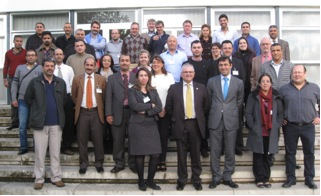An advanced course on olive oil marketing strategies is taking place this week at the Mediterranean Agronomic Institute of Zaragoza (IAMZ) from 4 to 9 November 2013. Co-organised by the International Centre for Advanced Mediterranean Agronomic Studies (CIHEAM), through IAMZ, and the International Olive Council (IOC), this very important event will bring together some of the top specialists in this subject area who will address every topic in the economics and marketing of olive oil. The teaching aspects of the course have been overseen by the Vice Chancellor of the University of Jaén, Manuel Parras. The 29 participants are from 12 member countries of the IOC plus Palestine, 23 of whom have received a scholarship from the IOC (2 participants each from Algeria, Argentina, Egypt, Iran, Iraq, Israel, Jordan, Lebanon, Morocco, Tunisia and the European Union and 1 from Turkey) and five from IAMZ, to cover their travel and subsistence expenses and enrolment fees.
The course was officially opened by IOC Executive Director Jean-Louis Barjol, who gave a general talk on the current situation and trends on olive oil markets worldwide. Next to speak were M. Parras who gave lectures on the basics and general concepts of marketing management, strategic marketing planning and the marketing mix, and A. Olavarría whose lecture focused on a case study of the positioning of the Oleoestepa brand.
On Tuesday Vice Chancellor Parras lectured on change factors and strategies for the future in the olive oil sector while J. M. García Álvarez-Coque explained the new international framework arising from the WTO, CAP and CMO. Trends in food consumer behaviour were analysed by A. Gracia with reference to the case of Spanish olive oils. Next, C. de Toro presented a case study of the use of olive oil as an input in the meat processing industry. Another subject of major interest was broached by J.C. Marzal who gave a lecture on strategies based on information and communication technologies. The course participants then met in working groups in the late afternoon for tutored working sessions.
On Wednesday sectorial strategies will be analysed in a paper on quality enhancement and certification schemes by J. Sanz, followed by two lectures reviewing marketing structures and strategies on several markets, specifically Turkey, given by C. Dologh, and the United States, Brazil, China and Russia, given by IOC Head of Promotion E. Gündüz. These will be followed by lectures by A. Langreo, L. Folque and A. Luque who will speak in turn about the strategies of the distribution sector, large bottling groups (Sovena) and olive oil cooperatives (Hojiblanca), prior to a field trip to a mass distributor (Carrefour).
Italian expert R. Zanoli will explore the use of business model development tools in olive oil mills and will analyse marketing structures and strategy in Italy on the Thursday before speaking about strategies in the organic olive oil segment. He will be followed by J. Sanz who will talk about local production systems, F. Núñez de Prado who will talk about protected designations of origin and M. Parras who will broach key factors in the consumption of organic extra virgin olive oil. The day will end with more tutored working sessions.
On Friday the course will focus on branding and packaging as a distinctive sign in a lecture by F. Torres Ruiz and segmentation and types of message in communication planning, the subject covered by M. Blay. In an analysis of institutional actions, E. Gündüz will address the role of the IOC in the promotion of olive oil. The results of the working groups will be presented in the afternoon.
Before returning home, participants will be taken on a field tour of a local olive orchard on the Saturday.
The IOC will shortly be publishing a paper reporting the conclusions of this course.
.










